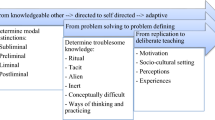Abstract
Understanding and undertaking technological practice is fundamental to student learning in technology education in New Zealand, and the enhancement of student technological literacy. The implementation of technology into New Zealand’s core curriculum has reached the stage where it has become critical that learning programmes are based on student progression to allow for a seamless education in technology from early primary to senior secondary. For this to occur, teachers and students need to focus learning on key features of technology education.
This paper is based on research initiated in 2001 which explored the nature of progression of student learning in technology. It draws on findings from research undertaken in New Zealand classrooms in 1999–2000 that resulted in the development of the technology assessment framework (TAF), (as reported in detail Compton & Harwood 2003). The 1999–2001 research was funded by the New Zealand Ministry of Education. Findings from the 2001 research allowed for the identification of key features of technology education that are relevant across all age groups, contexts and technological areas. These key features were collectively termed components of practice. The three components of practice established to date are brief development, planning for practice, and outcome development and evaluation. This paper discusses the development of progression matrices for each of these and provides illustrative examples of student work levelled against the matrix indicators of progression for brief development.
Similar content being viewed by others
References
Burns, J.: 1997, ‘Implementing the Technology Curriculum: Promise and Prospect’, Paper presented at the inaugural Technology Education in New Zealand (TENZ) conference, Christchurch, October 1997
M. Barnett (1994) ArticleTitle‘Designing the Future? Technology, Values and Choice’ International Journal of Technology and Design Education 4 51–63 Occurrence Handle10.1007/BF01197583
M. Barnett (1995) ArticleTitle‘Literacy, Technology and “Technological Literacy”’ International Journal of Technology and Design Education 5 119–137 Occurrence Handle10.1007/BF00766812
Compton, V. J.: 1997, ‘Implementing Technology Education in New Zealand Schools’, in J. Burns (ed.), Technology in the New Zealand Curriculum – Perspectives on practice, Dunmore Press, Palmerston North.
Compton, V. J.: 2001, ‘Developments in Technology Education in New Zealand 1993–1995: An Analysis of the Reflections of Key Participants’, Unpublished Doctoral Thesis, University of Waikato, New Zealand.
Compton, V. J. & Harwood, C. D.: 1999a, ‘TEALS Research Project: Starting Points and Future Directions’, Paper presented at the 2nd TENZ Conference, Auckland New Zealand, 14–16 April 1999.
Compton, V. J. & Harwood, C. D.: 1999b, ‘TEALS Research Project: From Directions to Classroom Practice’, Paper presented at the 30th Australasian Science Education Research Association Conference (ASERA), Rotorua, New Zealand, 8–11th July 1999.
V. J. Compton C. D. Harwood (2003) ArticleTitle‘Enhancing Technological Practice: An assessment framework for technology education in New Zealand’ International Journal of Technology and Design Education 13 IssueID1 1–26
V. J. Compton A. T. Jones (1998) ArticleTitle‘Reflecting on Teacher Development in Technology Education: Implications for Future Programmes’ International Journal of Design and Technology Education 8 IssueID2 151–166 Occurrence Handle10.1023/A:1008808327436
Davies J. (1998) ‘Constructing Technology Education: Questions of Purpose and Fit’. New Zealand Annual Review of Education 119–146
A. Drengson (1990) ‘Four Philosophies of Technology’ L. Hickman (Eds) TechnologyasaHuman Affair McGraw-Hill New York, NY 25–40
K. Hansen (1997) ArticleTitle‘Science and Technology as Social Relations: Towards a Philosophy for Liberal Education’ International Journal of Technology and Design Education 7 49–63 Occurrence Handle10.1023/A:1008877709733
A. T. Jones V. J. Compton (1998) ArticleTitle‘Towards a Model for Teacher Development in Technology Education: From Research to Practice’ International Journal of Design and Technology Education 8 IssueID1 51–65 Occurrence Handle10.1023/A:1008891628375
J. Lave E. Wenger (1991) Situated Learning: Legitimate Peripheral Participation Cambridge University Press Cambridge
T. Lewis C. Gagel (1992) ArticleTitle‘Technological Literacy: A Critical Analysis’ Journal of Curriculum Studies 24 IssueID2 117–138
D. MacKenzie J. Wajcman (Eds) (1985) The Social Shaping of Technology Open University Press Buckingham
Mather, V. J.: 1995, ‘Students’ Concepts of Technology and Technology Education: Implications for Practice’, Unpublished Masters Thesis, University of Waikato, Hamilton
Ministry of Education, 1993, The New Zealand Curriculum Framework, Learning Media, Wellington
Ministry of Education, 1995, Technology in the New Zealand Curriculum,s Learning Media, Wellington
A. Pacey (1983) The Culture of Technology Blackwell Oxford
Pellegrino, 2002, ‘How People Learn: Contributions to framing a research agenda for Technology Education’, in H. Middleton, M. Pavlova, D. Roebuck (eds.), Learning in Technology Education: Challenges for the 21st Century, Volume 1, pp. 114–129.
S. Petrina (2000) ArticleTitle‘The Politics of Technological Literacy’ International Journal of Technology and Design Education 10 181–206 Occurrence Handle10.1023/A:1008919120846
A. Rasinen (2003) ArticleTitle‘An Analysis of the Technology Education Curriculum of Six Countries’ Journal of Technology Education 15 IssueID1 31–47
J. Rothschild (1982) Women, Technology and Innovation Pergammon Press Oxford
K. Sawyer (2002) ArticleTitle‘Unresolved Tensions in Sociocultural Theory: Analogies with Contemporary Sociological Debates’ Culture & Psychology 8 IssueID3 283–305
Stevenson, 2002, ‘Transforming Learners Through Technology Education’, in H. Middleton, M. Pavlova, D. Roebuck (eds.), Learning in Technology Education: Challenges for the 21st Century, Volume 2, pp. 203–210
J. Wajcman (1991) Feminism Confronts Technology Polity Press Cambridge
Wells, G.: Retrieved 2004, ‘Dialogic Inquiry in Education: Building on the Legacy of Vygotsky’, Online http://www.oise.utoronto.ca/∼gwells/NCTE.html.
Author information
Authors and Affiliations
Corresponding author
Rights and permissions
About this article
Cite this article
Compton, V., Harwood, C. Progression in Technology Education in New Zealand: Components of Practice as a Way Forward. Int J Technol Des Educ 15, 253–287 (2005). https://doi.org/10.1007/s10798-004-5401-6
Issue Date:
DOI: https://doi.org/10.1007/s10798-004-5401-6




